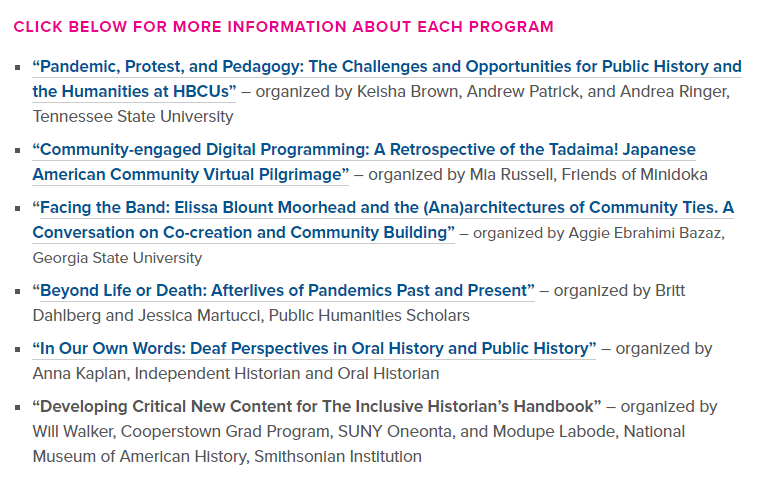Reflections on (relatively) rapid-response programming
23 February 2021 – Stasia Tanzer
Last year, in my role as the membership coordinator for National Council on Public History (NCPH), I had the pleasure of helping put on several virtual programs in response to the Covid-19 pandemic. Soon after lockdown began and public history institutions started cutting hours and furloughing or laying off staff members, at NCPH we asked ourselves, in the spirit of rapid-response collecting, what could NCPH do for struggling public historians? Here are some reflections on what we learned from our programming.

This screen shot lists the six programs NCPH funded with its COVID-19 Relief Funding, ranging in topics from work at HBCUs to Deaf oral history.
Since the possibilities were endless, instead of designing something that might not meet people’s needs, we surveyed our audience to gather feedback on how practitioners had been affected by the pandemic and what they were looking for to stay engaged with the field and their colleagues. One detail in particular stood out to us: many of you wanted opportunities for professional development and spaces where you could gather and discuss issues facing the field. Our response was to create a Request for Proposals (RFP) for virtual programming. We had about $5,000 in our endowment that was already set aside for diversity, inclusion, and accessibility, which was used specifically to support programs put on by public historians who had been furloughed, laid off, or had their hours, salary, or benefits reduced; those who identified as Black, Indigenous, or People of Color (BIPOC); and disabled people. We also had about $2,000 set aside for typically in-person mini-cons and workshops that could be used for anyone.
Those funds were used to support six incredible programs. We had no idea how long the pandemic and lockdown would last or how Zoom-fatigued we’d become. Regardless, these programs were a bright spot during a difficult time. Topics ranged from a workshop series about history and the humanities in historically Black colleges and universities (HBCUs); an intimate discussion on disability studies and how this informs the Covid-19 pandemic; a reflection on a nine-week community-led virtual programming effort; a keynote with an award-winning artist and curator; and a panel of Deaf individuals addressing how oral histories should be conducted with the Deaf community. The sixth and final project will be a collection of four new publications for the Inclusive Historian’s Handbook regarding the current moment and an accompanying webinar with the authors.
Overall, planning and putting on these programs was simple. We had few expectations, but we knew we wanted to provide a space to meet and talk that featured high quality-content on topics of relevance to the larger public history community. We expected the organizers to do most of the legwork, as the NCPH staff of four couldn’t have planned six programs on our own in a short amount of time. Unsurprisingly, our organizers absolutely delivered! In fact, most planners seemed relieved to have the flexibility to choose their topics, speakers, and flow without us, micromanaging their work, and they were communicative about when they needed something from us. They figured out their preferred language for promoting discussions and in turn, we compiled the materials on our website and shared them via social media.
Ultimately, our greatest asset also caused our biggest hiccup: we had few expectations. I would continue to have a largely hands-off approach to sponsoring future virtual programs organized by non-NCPH staff, but there are a few things I’d make clear from the beginning. If we do this again, I would identify a single point person per program, rather than wrangling several organizers and panelists simultaneously, and require all programs be recorded and resources shared on our website after each event. For most of the programs, we did communicate with only one or two people, which went well. Others, however, included multiple panelists, each of whom naturally had their own requests, concerns, and response times, making it difficult to communicate our needs and respond to their needs in return. In those situations, there were also so many voices that it was difficult to approve having the programs recorded and disseminating the material afterward.
My other main takeaway from this effort is that we should give ourselves more time to plan and schedule everything. When conceived, these programs were intended to occur between the time of acceptance, which wound up being in late August, through the end of the year. Most of the planners needed more time to put their programs together, however, which was a contingency we should have foreseen. In the end, half of the programs took place within the same week, right before Thanksgiving. Each program had satisfactory attendance, but with more foresight and planning we could have better spotlighted each event and truly focused on promoting each one instead of grouping them together, which was likely overwhelming for prospective attendees.
Despite these difficulties, I believe each program was a grand success, and a few served as a launching point for future projects. I look forward to seeing where the projects go, and possibly bringing you more programs in the future. In the meantime, you can check out some of the content from last year’s programs.
~Stasia Tanzer is NCPH’s membership coordinator. She previously served as NCPH’s graduate assistant while pursuing her Public History MA at Indiana University-Purdue University Indianapolis.



